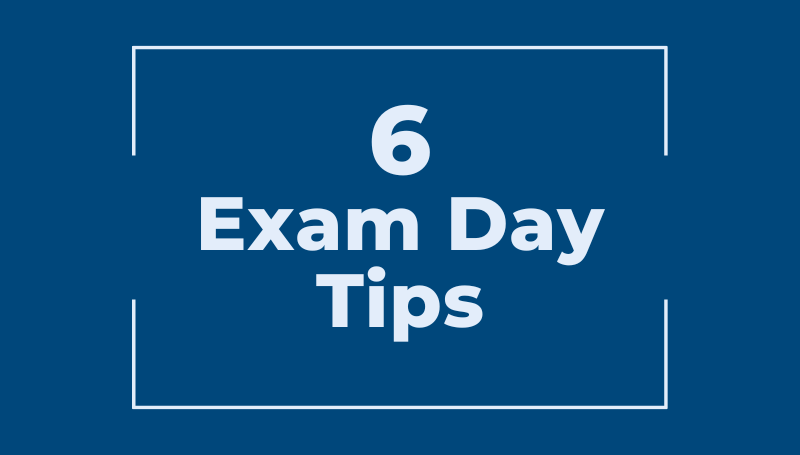
You’ve committed time, energy, and effort to prepare for your exam. Whether you are taking the certification, recertification, ITE or any other kind of test, make sure you are able to demonstrate all your hard-won knowledge when the big day comes. Here's how.
1. Read about what to expect on the day of your exam
We've compiled two blogs for everything you need to know for the day of your ABIM Exam or ABP Exam, make sure you give the one that applies to you a read! We go over everything you'll need to bring with you, what the schedule will be like, and what to know about the testing computer. You can relieve a bit of stress about exam day by being as prepared as possible!
"Know where you’ll need to be and how long it will take to get there. Figure out parking, and what you’ll need to bring (paperwork, ID, food, layered clothing, etc.)."
— Mark Yoffe, MD (MedStudy Physician Educator)
2. Don’t stay up late cramming the night before
Let's be honest. Cramming is not only super tiring, but it also does nothing to relieve the anxiety that you may not remember crucial information the next day. The information you're trying to cram in your head last minute might not even stay in there until tomorrow. So, IF YOU MUST study the night before, pick just one or two topics that you think need the most fine-tuning and give those a look-over. Other than that, it is much better to have a relaxing evening—without alcohol—and go to bed early enough to be well rested.
"Get enough sleep the night before, eat and drink in moderation, and avoid reviewing study materials unless absolutely necessary." - Nizar Maraqa, MD (MedStudy Physician Educator)
3. Eat a healthy breakfast
Make sure you eat a healthy breakfast on exam day! That way you'll be able to think about the questions on your exam and not a rumbling stomach. Having a sensible diet is important for your brain in general! In our StudyWise guide, we recommend avoiding a diet high in carbs; as it adds an increased risk of weight gain, diabetes, and heart disease—and the ups and downs in blood sugar interfere with concentration.
Here's what a couple of our physician educators have to say:
"Have a good breakfast. Set out your ID and entrance papers the night before. Arrive early. Look at last-minute notes. And be confident—you’ve got this!" - Cathy Hatchell, MD (MedStudy Physician Educator)
"My advice for the day of the exam begins the night before! Get a good night’s sleep. Then in the morning do your regular routine as much as possible. This will keep you in your normal rhythm and your mind clear. Get a good breakfast, although not too much." - Mark R. Corkins, MD (MedStudy Physician Educator)
We recommend a light lunch too since a large lunch could make you sluggish for the afternoon testing session(s). Again, eat healthily and check your caffeine intake.
4. Dress for comfort
Wear nonrestrictive clothing that makes you feel confident. During your exam, you don't want to be itchy, cinched, too hot, too cold, etc. You will not be allowed to wear a jacket or a coat, so we recommend that you wear layers (like a sweater!) so you can wear more/or less depending on the temp in the room.
"Wear comfortable clothes. Relax! You got this!" - Peter Huynh, MD (MedStudy Physician Educator)
5. Take advantage of breaks
We recommend that you take at least a portion of all breaks to get up and stretch. Just like when you're studying, taking a break and engaging in a brief distraction from the task can help with memory. Don't try to do any studying or look up answers during your break time, take this time to truly have a break!
"Stay calm, take your time, be confident, don’t bring any books with you and do not check for questions/answers on breaks—this will just add anxiety." - Rafael Turbay, MD (MedStudy Physician Educator)
6. Engage in positive self-talk
Think positively about your performance and communicate positive messages to yourself. Negative emotions can overwhelm your capacity for thinking clearly under stress. Chances are, leading up to this exam you've done a good bit of studying and prep! Remind yourself of all the late-night study sessions and Q&As you aced!
"Remind yourself how well prepared you are when you wake up and don’t look at any study materials. It’s all about confidence at this point and you should keep reminding yourself that as you walk into the exam." -N. Kevin Krane, MD (MedStudy Physician Educator)
BONUS TIP: Draw motivation from those close to you
Maybe you feel weird about pumping yourself up? Well, in that case, ask a close friend, mentor, spouse, or parent to send you a text or call you the day of and give you the motivation to do your best!
"Call someone you love and trust that will make you smile. That way you will remember they’ll love you no matter what your score on the exam is. Smile, relax, and go take it." -Mark R. Corkins, MD (MedStudy Physician Educator)
Need some more positivity tips for exam day? Read How To Be Positive Going Into Your Board Exam
And if you need more tips on how memory works, download our StudyWise guide. Its brain-hacking techniques just might revolutionize the way you study—and test!


